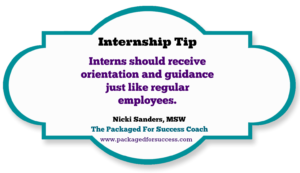By Alex Mooradian
Successful engineering internship programs have one thing in common: they simply ignore the word “intern.” From the recruiting process, entrusted workload to valued feedback loops, companies that invest in their interns as if they’re long-term hires believe they have better results. As Jade Rubick, engineering manager at New Relic says “the basic rule in my book: don’t treat interns like interns.”
Here are some key attributes shared across the top engineering internship programs at today’s tech companies and startups.
Recruiting Process
A key mindset to adopt from the start is that your recruiting approach for interns should be just as intense and important as that of your full-time hires. Think of it this way: Joe or Jane Student, Class of 2015, is potentially your next VP of Engineering. Companies with successful internship programs anticipate that these “temporary” employees will become long-term team members and recruit accordingly.
At WhitePages, for example, the company approaches career fairs not as an opportunity to amass stacks and stacks of resumes but instead as a chance to meet face-to-face with each candidate. Interested students are both vetted and sold on the company. The company is not only looking for students with the required core skills, but potential matches for the team, culture, and work environment long-term. Those who qualify are then invited to a hosted meet-and-greet party; the same level of wooing that would happen for a full-time hire. By investing this extra effort into their recruiting process, the team identifies students who share their enthusiasm for the company’s initiatives and have bought into the idea of working there. Says Robert Noble, director, software engineering, “in the long run, the process really pays off when we have a stellar addition to our team.”
Have a Plan
One of the easiest ways you can sabotage your engineering internship program is to not have a plan. There’s nothing worse than a highly qualified engineering intern showing up on the first day and having nothing of value to do. CTO of Madison Logic and MIT Professor Mark Herschberg, who counsels hundreds of job seekers each year, agrees that “the assigned projects should be of both value to the company and the intern.” Way before an intern even steps foot in the office (and arguably before they are even recruited), senior management should identify the key business projects that could be completed during the intern’s assignment. The team should then define how the projects relate to the company’s overall objectives and be prepared to explain that alignment to the intern on their very first day.
Finally, clearly outline what skills will be learned while working on the project: learning a new coding language, sharpening presentation skills, or maybe applying a theoretical concept they learned in class. Helping the student to enumerate and recognize the learned skills will further engage them in both the project and the company’s objectives.
No Coffee Fetching – Give Engineering Interns Real Work
Hiring an extremely well-qualified engineering intern is definitely not an excuse to offload your company’s nagging to-do list. Raj Kadam, Viralheat’s CEO, believes that one of the best ways to ensure engineering interns have a good experience is “to give them projects that have a huge impact on the company.” Senior management puts interns to work on parts of the product that it can see fully deployed to the customer and that start impacting the bottom line. This level of trust and engagement of the interns fosters meaningful relationships. Robert Noble at WhitePages agrees: “there’s no coffee fetching here. Every engineering intern we hire ships code to production.”
The same is true for us at Readyforce. This past summer, our summer interns designed and implemented programs to enhance engagement. One team of interns, Andrew Wu and Tansen Zhu, designed and fully implemented LANHAMMER, a $100,000 combo eSports gaming tournament and networking event for Bay Area interns. Jason Adleberg wrote and pushed the code for a new mapping feature that allows students to visually connect with one another.
Some of the best “free” advertising for your program will come when your intern returns to campus and shares how their contribution shipped.
Assign an Obi-Wan
Tasking an engineering intern with solving live company problems is both empowering and hopefully productive for everyone involved.
Just don’t throw them in without a reliable backup.
Top internship programs assign mentors and find ways to foster those relationships. Give your intern a resource to bounce ideas off of, and go to for mission-critical questions. Encourage social events for the interns to interact with mentors and the rest of the team. By creating a welcoming environment, interns will be more likely to ask questions and solicit feedback which inherently strengthens the whole team.
Along those lines, another suggested best practice again by Mark Herschberg is to create an environment with “peer learning.” Create weekly events or get-togethers for your interns to come together and share what they’ve learned. As Mark says “peer learning can be very effective. Even if you don’t have more than one intern, reach out to other small companies in your area and create your own cross-company intern group that might get together for a lunch once a week.”
Say It To Their Face – Feedback
If you wait until your intern’s last day to see if they’d had a meaningful experience, you’ve totally missed the boat. The most successful internship programs incorporate regular check-ins with their interns throughout their assignments. Formal feedback sessions may involve the intern meeting with HR midway through or going for “coffee chats” with senior management, while informal feedback is gathered during weekly meetings with their manager. Prioritizing these meetings ensures that questions are clarified and concerns are validated early and often.
Bottom line: engage engineering interns as if they are already full-time hires at your company and ask for feedback, lots of it.
Article originally appeared on eremedia.com.
Related Post: 5 Ways to Get the Best from Your Intern
